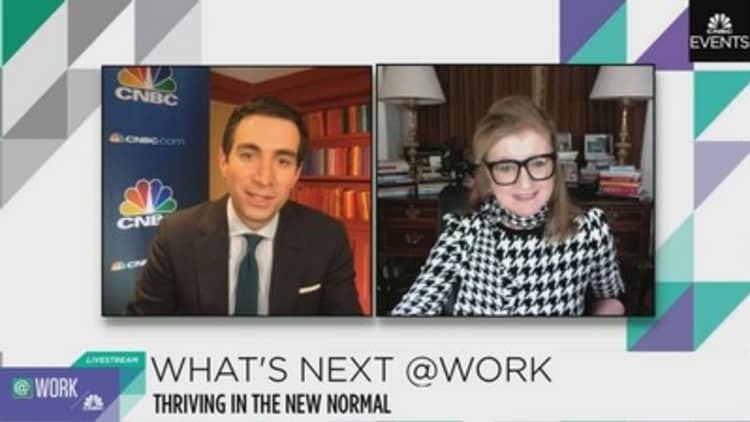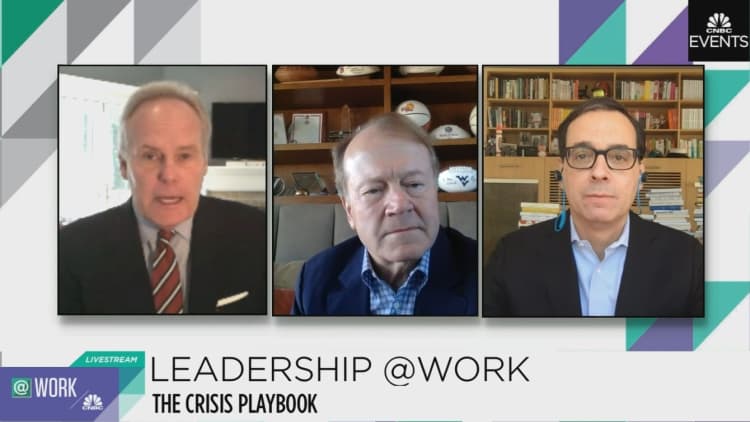The coronavirus pandemic has upended nearly every aspect of today's work environment, with millions of employees finding themselves suddenly working remotely, often in hastily set-up home offices, and others concerned that continuing to report to work could put their own health at risk.
More and more employees are dealing with stress, anxiety and isolation, and in the weeks or months ahead this may take a toll.
To help, many companies are relying on their employee assistance plans to offer guidelines on how to set daily routines and check-ins and juggle work and childcare — all while maintaining good overall health and exercise habits. Yet for some workers this support is not enough.
Experts say that the epidemic — and its aftermath — are still in the early days, and the needs of employees will likely change over time.
"I just had a connect with some of our Italian associates, and you can start to see the strain on their faces after three or four weeks of this without seeing an end in sight," says Nathalie Carruthers, executive vice president and chief human resources officer at Blue Yonder, a supply chain solutions provider with 5,300 employees worldwide. "I suspect we are going to start to see that in the United States as the reality of the situation starts to become more real. We don't really know where the need will be, but I suspect there will be more issues to deal with."
On Sunday health authorities warned this week could resemble a "Pearl Harbor moment" as the U.S. death toll creeps toward 10,000 and hospitals gird for an influx of newly infected patients.
A bottom-line issue
Supporting workers with mental health services is not only an ethical obligation for employers, it's also a bottom-line issue. More than 60% of workers say their mental health affects their productivity, according to a survey by Mind Share Partners, a nonprofit that works with companies to improve mental health resources. In 2019 the World Health Organization estimated that depression and anxiety cost the global economy $1 trillion per year in lost productivity. Given the emotional the toll of the pandemic, that price will likely be much higher this year.
"Employers who want to retain their employees and want them to focus and to be well need to take care of them in their time of need," says Cathleen Swody, an organizational psychologist and founding partner of management consultancy Thrive Leadership. "These things spiral. The stressors build up, especially if someone has preexisting tendencies to lean in that direction. This can be the straw that breaks the camel's back. Then it's an additional health issue that impacts the immune system. They're less likely to exercise or take care of themselves and more susceptible to the virus."
Arianna Huffington, founder and CEO of Thrive Global, agrees, noting, "We need a new playbook to manage work at this time." Speaking at CNBC's virtual conference "Leadership & Management Amid Crisis" on Thursday, she said that "it is now critical that remote workers take action to boost their physical immunity and mental resilience."

Mounting worries over financial security
Even before the coronavirus, financial concerns were among the chief causes of stress for Americans, with more than half saying that thinking about their finances can make them feel anxious. For the many Americans living paycheck to paycheck (or close to it), money concerns can feel even more overwhelming amid projections that millions will lose their jobs in the coronavirus crisis.
Giving workers assurances that they'll be able to keep their job — and their paycheck — through the crisis is one way that companies (who are in a financial position to make such promises) can immediately reduce their stress. A handful of high-profile companies, including Bank of America, Citigroup and Morgan Stanley, have already made such pronouncements publicly.
These things spiral. The stressors build up, especially if someone has preexisting tendencies to lean in that direction. This can be the straw that breaks the camel's back.Cathleen Swodyorganizational psychologist and founding partner of management consultancy Thrive Leadership
For employers who may not be in a financial position to make such promises, remaining transparent about the situation can still help assuage some worker anxiety.
"Leaders can still be empathetic and say: 'We don't know what's happening week to week, but here's what we do know now,'" says organizational psychologist Katy Caselli, founder of Building Giants. "And then tell them when you'll be able to share more information."
"As company ambassadors in times of crisis, leaders should be candid, transparent and show workers that they care," says Daniel Pink, author of "Drive: The Surprising Truth of What Motivates Us," who offered his views at CNBC's crisis leadership virtual conference.

John Chambers, former founder, executive chairman and CEO of Cisco, who has managed through several crises, including 9/11, the financial crisis and SARS epidemic in Asia, advises leaders to treat their employees "like you would like to be treated yourself." He adds, "Explain to employees this is how much we have in the bank; this is how we are trying to reinvent the company and save as many jobs as we can."
Currently founder and CEO of JC2 Ventures, Chambers says that how you handle today's challenges will define you.
The new normal
The coronavirus has been a boon for the growing work-from-home trend as companies seek to continue operations amid the global pandemic.
But while that's saving some industries right now from certain doom, it may not be a positive move for every worker, as many attempt to telecommute in hastily arranged home offices while simultaneously caring for their children.
Although the solitude of remote work may be beneficial to some, others thrive with live, human interaction and face a higher risk of depression, anxiety and other mental health issues when forced to work from home.
Even before they were confined to their homes, 61% of American workers said they were lonely, according to a recent Cigna study. One way for employers to combat that is to make sure that managers make time for regular, one-on-one check-ins with every employee via video.
At Inquisitr Media, a news and entertainment website where employees are based throughout the country and have always worked remotely, CEO Dominick Miserandino says there's still been an adjustment to the new normal of working from home with a full house and concerns about illness and other issues, like getting food deliveries. Miserandino says he makes a point of regularly checking in, or having his administrative team check in, with all 80 employees.
"The problem at hand is that everyone is scared, and understandably so," he says. "That's the elephant in the room, and you have to address it. We don't have answers. We don't know if this is going to last for six weeks or six months. But I can acknowledge that's the situation."
While challenging, there have also been some upsides to the mass transition to telework.
"People are more mindful of checking in with each other regularly, and our employees who were remote [before the coronavirus restriction] feel like this is the first time anyone has ever done that with them," says Anne Benedict, chief human resources officer at Infor. "Work has become a little more personal because you literally have a [videoconferencing] camera in workers' homes. You can see where they work and where their kids are."
Front-line workers during the crisis
The "essential" workers who are still working onsite through the crisis include not only medical professionals and first responders but also food-service workers and delivery drivers, who often have never experienced this level of stress or health risk while on the job.
As a result, many employers are trying to come up with solutions to mitigate their anxiety and stress through this difficult time. Starbucks, for example, announced in March that it would provide 20 mental health sessions per year with a therapist or coach for eligible employees and their family members.
For several years managers at Chipotle have done a "wellness check" with every employee reporting for a shift, asking them whether they have any illness symptoms or are caring for someone at home who has one. Since the emergence of the coronavirus, field managers have also started doing mental health check-ins as well, says Marissa Andrada, the chain's chief people officer.

"It's that emotional piece beyond how you are feeling," Andrada says. "It's also 'How are you doing? What's going on?'"
The company began offering free mental health counseling to all its 83,000 workers in January, before the crisis, and in March it announced a short-term 10% wage increase for hourly workers to show their appreciation for them working under difficult circumstances. The company also recently announced that it is also issuing bonuses to some of their workers.
"We hear from them all the time now that they're just thankful that they can go to work and earn a paycheck," Andrada says.
Looking ahead
Mental health experts agree that even after the immediate coronavirus crisis has passed, the impact on employees' psyche could be lasting. One report by researchers at Peking University, published in the medical journal "Lancet," projected that the mental health problems created by coronavirus could exceed the consequences of the 2019-nCoV epidemic itself by triggering disorders such as anxiety, depression and post-traumatic stress.
"There is a real concern that we will see widespread anxiety, PTSD, depression, high suicide rates and a high incidence of substance abuse," says Darcy Gruttadaro, director of the American Psychiatric Association Foundation's Center for Workplace Mental Health. "We need to be ready for that, and we already have a fragile health-care system in this country."
There is a real concern that we will see widespread anxiety, PTSD, depression, high suicide rates and a high incidence of substance abuse.Darcy Gruttadarodirector of the American Psychiatric Association Foundation's Center for Workplace Mental Health
Even before the pandemic, the United States had a workplace mental health crisis. More than three-quarters of workers recently told Gallup that they sometimes felt burnt out at work, and more than 1 in 5 said they felt that way very often. Add in issues related to coronavirus, and employers will need to go beyond EAPs to make sure that their health plans offer adequate service.
"Sometimes EAP support is enough, but people with depression, anxiety and PTSD often need to see a medical provider," she says. "Employers have to recognize that this is coming and talk to their health plans about how they'll equip primary-care providers to address mental health and increase their network of behavioral health professionals. This is a tsunami coming, and the employers need to be ready."
Additional reporting by Lori Ioannou, senior editor, CNBC.com





